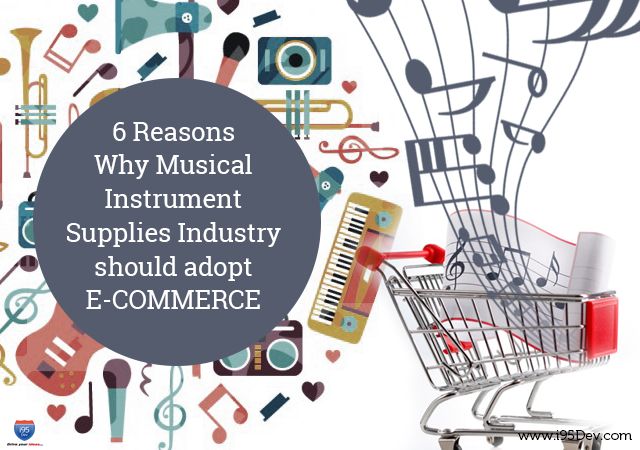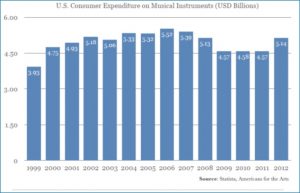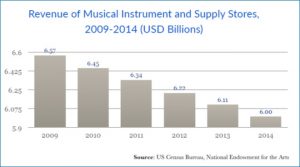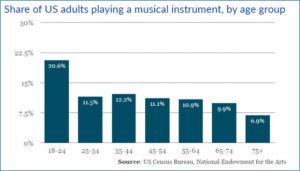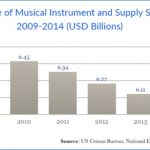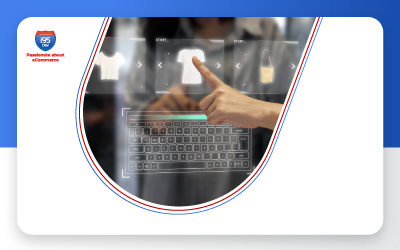Musical instruments and supplies industry is at a major crossroads. While the industry is witnessing stagnation with the revenue growth remaining sluggish over the last few years, digital technologies are disrupting the way business is conducted in the industry.
Consider this, Guitar Center, Inc., the largest and most prominent retailer of musical instruments and supplies, was betting big on big box retail stores back in 2014. So much so that it announced to add between 15 and 20 stores to its already existing fleet of 262 locations; when websites like Amazon.com, eBay, and Craigslist saw their sales of musical instrument increase more and more.
Further, in 2014, when Guitar Center was undertaking major restructuring to increase its profitability many companies reported extremely successful 2014. The main area of growth was clear: the robust expansion of e-commerce.
Come 2015, Guitar Center decided to renew their focus on the e-commerce store by deploying a new e-commerce platform. They even evaluated new technologies to improve conversions by adding features like mobile optimization, improved navigation and more.
Note, with digital retailers making major inroads, the future success will be determined by those able to innovate to take the market share from the established firms.
Reasons for E-commerce in Musical Instrument and Supplies Industry
Retailers cannot deny the role of e-commerce in achieving significant growth. What will further help them differentiate is how they leverage mobile and internet-based technologies to enhance the buyer experience.
Moreover, in the last few years, innovation in the industry and the revenue growth was entirely driven by online retailers, rather than capital-intensive brick-and-mortar retailers.
1) Changing Consumer Demographics
The 18-24 demographic is the dominant group when it comes to music and they have grown on mobile and e-commerce. Retailers, without an e-commerce store, will find it difficult to associate with their customers and worse might even end up alienating them.
2)Decreasing Margins
The sluggish growth in the industry and rising competition have put pressure on the margins and they have been on a decline. The e-commerce store can help retailers reduce their operational costs and costs of running the business, giving them the cushion they need to service their customers better while remaining profitable.
3) Gain the Competitive Edge
Thanks to the stagnant customer base, retailers in the musical instruments industry have two options: take share from the existing companies, or find a way to grow the category. For this, only firms showing urgency to innovate before the competition will find success. E-commerce can give retailers the platform to innovate and drive success. They can try various business models and service offerings that were not possible before. Moreover, with e-commerce retailers no longer have to limit themselves to a specific location and can service customers across geographies.
4) Easy to Nurture your Customers
The purchase decisions in this industry are driven by people’s emotions and passion. They do a lot of research and seek expert advice before buying any musical instrument or equipment. This, connecting customers with store representatives with specialized knowledge, was the most important values addition that brick-and-mortar stores provided.
In e-commerce, this customer education process now can very easily be executed using videos, images and documents. Moreover, the entire process can be automated to nurture your customers and keep them coming back for more. Retailers can further leverage channels like social media, live chat, etc. to personalize the customer experience.
5) Improve the Customer Experience
Selling musical instruments is quite different from selling consumer electronics. With electronics consumers look for features and price, but with musical instruments, the customer experience is the key differentiator. If your e-commerce store can make them feel what they feel when are playing the instrument, then the sale is made.
With e-commerce, store features like personalization and marketing automation can be leveraged to provide customers a superior shopping experience at a speed and channel they prefer. Providing a similar experience in the brick-and-mortar setup alone can be a very time and resource consuming exercise. In addition, with technology advancements like virtual reality and mixed reality the experience can be taken to a different level directly from the e-commerce store.
6) Leverage the Customer Insights
E-commerce store captures a lot of data, data that can be very well leveraged by retailers to better target their customers and increase sales. Retailers can leverage insights from information like customer ratings and reviews to change their product roadmap, their product portfolio, and their procurement strategy. Further, insights from information like the location driving maximum traffic to the e-commerce store can be leveraged to organize events and concerts; which can boost sales drastically.



